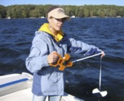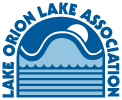Testing & Results
 Chief Science Officer
Chief Science Officer
Michael Kellar
» Click here to view Lake Orion Testing Results
Scroll down for links to additional reports & info.
My name is Michael Kellar and I represent the Chief Science Officer on the board of directors in the Lake Orion Lake Association.
I had an admiration of Lake Orion ever since I was a kid, as my dad would frequently take me there to go fishing. As I got older, it was always a dream to live on the lake, and after several years of searching the market, I was lucky enough to find a nice place on the north end of the lake in 2009. In 2020 I moved to the West end of the lake. I currently hold a master’s degree in engineering from LTU, and my hobbies include spending time with my family, fishing, boating, music, and snowmobiling in the Winter months.
I enrolled Lake Orion in the Cooperative Lakes Monitoring Program in 2018 and have been doing it ever since. Joining the board of directors at LOLA to represent Water Quality only made sense.
LOLA has been enrolled for many years with the Department of Environment, Great Lakes, and Energy (EGLE), and the Cooperative Lakes monitoring Program, where the mission is to network and expand volunteer water quality monitoring organizations statewide for the purpose of collecting, sharing and using reliable data; educate and inform the public about water quality issues; and foster water resources stewardship to facilitate the preservation and protection of Michigan’s water resources. LOLA is currently looking to collaborate with several local schools to expand knowledge and awareness within our youth for the future.
Lake Orion is classified as a healthy medium-sized mesotrophic inland lake, with an area of 506 acres. It has a maximum depth of 80 feet and an average depth of 16 feet.
LOLA provides all funding necessary for the equipment and supplies needed, and we currently monitor the water samples found below:
Spring and late Summer Phosphorus samples (Samples collected within 2 weeks of ice-off and late September)
Phosphorus is an essential nutrient for algae and plant growth. Summer total phosphorus is used to estimate your lake’s productivity (trophic status) – Oligotrophic, mesotrophic, or eutrophic.
Secchi Disk (measurements taken Bi-weekly)
A Secchi disk is a simple tool that measures water transparency/clarity. Consistent Secchi disk transparency measurements are a useful indicator of lake quality changes and trends.
Chlorophyll samples (Water samples taken once a month in conjunction with Secchi Disk)
Chlorophyll is a measure of the amount of algae growing in your lake. Chlorophyll measurements help determine the productivity (trophic status) of your lake– Oligotrophic, mesotrophic, or eutrophic.
 Volunteer opportunities are available!
Volunteer opportunities are available!
For more information please visit micorps.net or email [email protected]
PLM Lake & Land Management Corp. Year-End Reports
» 2024 Lake Orion Management Plan Update (PDF)
» 2024 Aquatic Vegetation (AVAS) Summary (PDF)
» 2024 Water Quality Monitoring Report (PDF)
Lake Orion Weed & Algae Treatment Schedule
Lake Orion Monitoring Data
Special Assessment District (SAD) #2 – Lake Orion
SAD #2 has been approved and will be a continuation of management and treatment of invasive aquatic weeds on Lake Orion. Aquatic weed management is essential to protecting the lake aquatic habitat, lake health and property values. Informational booklets with key information about the proposed SAD #2 were mailed to all lakefront property owners.

